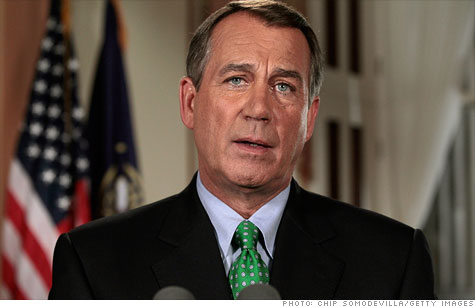Search News

House Speaker John Boehner is rewriting his bill to add more deficit-cutting measures.
NEW YORK (CNNMoney) -- With the clock ticking down, House Speaker John Boehner will rewrite his debt ceiling legislation to ensure that it meets his oft-stated pledge to cut spending more than Congress increases the federal borrowing limit.
That was the word from Boehner's office after the Congressional Budget Office on Tuesday evening estimated that the Budget Control Act of 2011 would reduce deficits by only $851 billion over 10 years.
By contrast, Boehner's bill would have allowed for an immediate debt ceiling increase of $900 billion.
"We promised that we will cut spending more than we increase the debt limit -- with no tax hikes -- and we will keep that promise," Boehner spokesman Michael Steel said in a statement to CNN. "As we speak, congressional staff are looking at options to rewrite the legislation to meet our pledge." (Read: How long should an increase last?)
Boehner's plan -- and a competing Democratic bill in the Senate -- are are the only live bills this week that would increase the debt ceiling by Aug. 2. The ceiling must be raised by then, when the Treasury Department estimates it will no longer be able to pay all its bills without borrowing.
A House vote planned for Wednesday was pushed back a day following the CBO report.
The CBO said the bulk of deficit savings under Boehner's original bill -- $710 billion -- would result from caps on discretionary spending.
The other big chunk of savings -- $136 billion -- would come from reduced interest costs on the debt.
Almost as soon as he proposed it on Monday, the bill came under fire from the most conservative members of his caucus and some conservative groups for not going far enough to reflect the principles of the Cut, Cap and Balance Act, which the House passed last week.
Cut, Cap and Balance would, among other things, cut total spending by $111 billion for fiscal year 2012. It would also require a balanced budget amendment to the Constitution that would cap total annual spending at 18%.
The spending caps in Boehner's bill would result in small savings in the early years, but the savings would grow over time.
In addition, the Boehner bill would require that both chambers of Congress vote on a Balanced Budget Amendment but doesn't require that one be enacted.
"Only a Balanced Budget Amendment will actually solve our debt problems," Republican Study Committee Chairman Jim Jordan said in a statement Tuesday explaining why he wouldn't support Boehner's bill.
The conservative Club for Growth also expressed its displeasure. "It cuts almost nothing immediately, it caps only discretionary spending, and it does not require passage of a balanced budget amendment." (Read: Betting on a U.S. default)
Boehner is in a tough spot. He recognizes that the debt limit must be raised to prevent the country from defaulting on its obligations. But he is also representing the will of his most conservative members, who have not yielded in their demands for large, immediate spending cuts as a condition for raising the debt ceiling.
That has put him at odds with Obama, who has pushed for a debt reduction package that also includes a revenue component. ![]()
| Overnight Avg Rate | Latest | Change | Last Week |
|---|---|---|---|
| 30 yr fixed | 3.80% | 3.88% | |
| 15 yr fixed | 3.20% | 3.23% | |
| 5/1 ARM | 3.84% | 3.88% | |
| 30 yr refi | 3.82% | 3.93% | |
| 15 yr refi | 3.20% | 3.23% |
Today's featured rates:
| Latest Report | Next Update |
|---|---|
| Home prices | Aug 28 |
| Consumer confidence | Aug 28 |
| GDP | Aug 29 |
| Manufacturing (ISM) | Sept 4 |
| Jobs | Sept 7 |
| Inflation (CPI) | Sept 14 |
| Retail sales | Sept 14 |